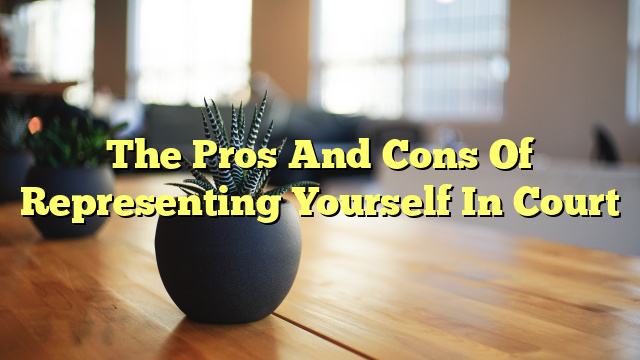Outline:
- Pros of Representing Yourself in Court
- Cons of Representing Yourself in Court
- Should You Represent Yourself in Court?
Pros of Representing Yourself in Court
One of the biggest advantages of representing yourself in court is the cost. A lawyer can be expensive and it is not always possible to find one that fits your budget. If you represent yourself, you won’t have to pay any legal fees, which can save you a lot of money.
Another advantage of representing yourself in court is that you know your case better than anyone else. You have access to all of the relevant documents, you know the facts better than a lawyer, and you are best positioned to argue your case. Representing yourself will also give you the freedom to make all of the decisions yourself, such as when to accept a settlement or when to proceed to trial.
For some people, representing yourself in court can also be an empowering experience. You will take control of your own life and make decisions that are in your best interest. This can be a gratifying experience, as you will have the satisfaction of knowing that you have done everything in your power to make the best outcome for yourself.
Cons of Representing Yourself in Court
Representing yourself in court can be a difficult and overwhelming experience. You may not understand the legal system and you may not know what to do or how to proceed. Even if you do understand the legal process, you may not be well-versed in court procedures and may make mistakes during the proceedings.
You may also not be familiar with the law, and even if you are, you may not be aware of all of the legal arguments that you could make on your behalf. Legal cases can be complicated, and if you do not have a thorough understanding of the law and the legal process, you may not be able to effectively present your case. This could have a negative effect on the outcome of your case.
Additionally, representing yourself in court can be emotionally taxing. You will be responsible for making all of the decisions, you will have to be prepared for cross-examination, and you may have to face an experienced lawyer. This can be an intimidating experience and can cause significant stress. You may also be overwhelmed by the prospect of having to represent yourself in court.
Should You Represent Yourself in Court?
The decision to represent yourself in court should not be taken lightly. It is important to consider both the pros and cons of doing so before you decide. You should consider the nature of your case, your understanding of the law, and your ability to present your case in court. It is also important to weigh the cost of hiring a lawyer against the cost of representing yourself.
In most cases, it is best to hire a lawyer to represent you. A lawyer is experienced in the law, understands court procedures, and can provide valuable guidance and advice throughout the legal process. They can also help to ensure that your case is heard in the best possible light and can help you to navigate the complexities of the legal system.
That said, there are some situations in which it may be beneficial to represent yourself in court. If you are confident in your understanding of the law and your ability to present your case, then you may decide to go it alone. Additionally, if your case is straightforward and the cost of hiring a lawyer is not within your budget, then representing yourself in court may be the best option.
If you do decide to represent yourself in court, it is important to prepare thoroughly. Make sure you understand the legal process, the law, and the court procedures. You should also research your case and make sure that you are prepared to present your arguments in court. With the right preparation, you can ensure

